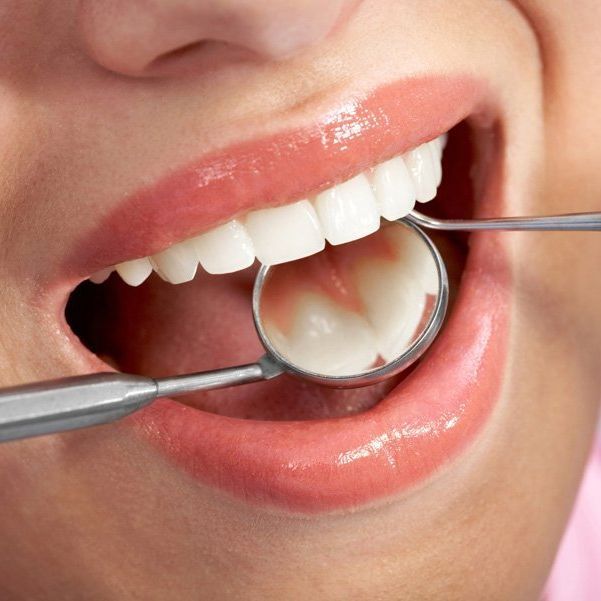
Tooth Extractions
for Brownwood, TX; Ballinger, TX & the Surrounding Areas
Many people need to have a tooth or numerous teeth extracted at least once in their lives, whether the tooth is causing them pain, it’s been severely damaged due to decay or an injury, or in preparation for dental implants or dentures.
To prepare you for a simple tooth extraction, your dentist will numb the area with a local anesthetic. However, if you need a surgical tooth extraction, you’ll likely receive both local anesthesia and intravenous anesthesia. The dentist or oral surgeon will then make a small incision in your gums in order to safely remove the tooth. It will likely take you a few days to recover from the procedure.
Reasons Why a Tooth Extraction is Necessary
- Tooth Decay: The build-up of tartar and plaque causes tooth decay. These deposits eat away at the enamel of the teeth, making them weak and brittle. When a tooth reaches this point of no return, it is necessary to remove it. Tooth extractions and replacements with dental bridges will avoid further health concerns.
- Periodontal or Gum Disease: If the integrity of the gum or bone around the tooth deteriorates too much, a tooth extraction may be necessary. This would be necessary to preserve the surrounding teeth.
- Overcrowding: Whether you are experiencing impaction from other teeth growing in, or your smile has always been overcrowded, tooth extraction may be necessary. Removing the problematic teeth in the back of the mouth can open up free space for the rest of the teeth to spread out as needed, preserving your straight smile without the need for braces.
If you need to have a tooth extracted, you might not know what to expect. Having a brief rundown of how you can expect the procedure to go is beneficial because it gives you a greater understanding and sense of control over the process. We can answer any questions you might have about your tooth extraction before your appointment so you have a better idea of how to prepare, but here is a brief overview of how it works:
Preparation:
Depending on your situation and how many teeth we are extracting, you might be asked to take antibiotics before your appointment. We will inform you of any other preparations you should make well in advance of the procedure. Make sure to make us aware of any medications you might take and about your medical history, particularly if you suffer from heart disease, liver disease, or a weakened immune system.
The Tooth Extraction
First, we will apply a local anesthetic to numb the area around your tooth so you do not feel pain. We will then use special tools to first loosen and then remove your tooth from the gum. Tooth extraction does not take long or cause any pain.
More Complex Procedures
For impacted teeth, multiple extractions, or complex cases, you might need to be sedated during the procedure. You will be given medication to ensure that you are relaxed and/or asleep, as well as an anesthetic to keep you free of pain.
After the Tooth Extraction
Once the procedure is completed, we will clean out the gum socket and smooth out any remaining bone. The gum may need to be closed with one or more stitches or sutures, but there will likely still be some bleeding. You will be asked to bite down on a damp piece of gauze to help control and stop the bleeding. You will be able to go home straight after the tooth extraction procedure is complete. You can expect your anesthetic to wear off in a few hours; at this point you may begin to feel some pain in your gums, which you can address with pain relievers or prescribed pain medication.
Recovery:
Everyone heals from a tooth extraction at a different rate, but you can expect it to take up to several weeks. For the first several days after the procedure, take any medication as directed and avoid doing too much activity to facilitate healing. You can apply a cold compress to your cheek for 10-20 minutes at a time to help reduce swelling and pain. Do not drink from a straw. Chew on the opposite side of your mouth and stick to soft foods until your wound heals, which can take several days. You may begin gentle brushing and flossing the day after your procedure, avoiding the area near the open socket until several days have passed and your wound has had a chance to heal. At this point, you may be asked to gently flush out the socket with a salt water solution to help avoid infection. Your stitches will loosen and dissolve on their own.
Side Effects:
In the unlikely event that you experience signs of infection, severe swelling or pain, excessive bleeding, trouble swallowing, or other alarming symptoms after your tooth extraction, you are welcome to contact our clinic with any questions.
If you have any questions or concerns about the tooth extraction procedure at any point, please reach out to our team.
Make an Appointment with Us
Coleman County Dental Center can provide you with a positive experience for your tooth extraction. In addition to our tooth extraction services, we also provide dental implants, implant dentures, crowns and veneers, and other cosmetic dentistry procedures to help patients that may be experiencing tooth loss.
Situated in Coleman, TX, our office is fully equipped to handle any tooth extractions for patients throughout Coleman, TX; Ballinger, TX; Brownwood, TX; Rowena, TX; Burkett, TX; Cross Plains, TX; Valera, TX; Talpa, TX; Novice, TX; Winters, TX; Santa Anna, TX; Rockwood, TX; and the surrounding areas.
We understand you may feel nervous about the procedures you need, but we’re here to provide a comforting and inviting environment for all of our patients. If you’d like to make an appointment with our cosmetic dentist, feel free to contact our office today!

